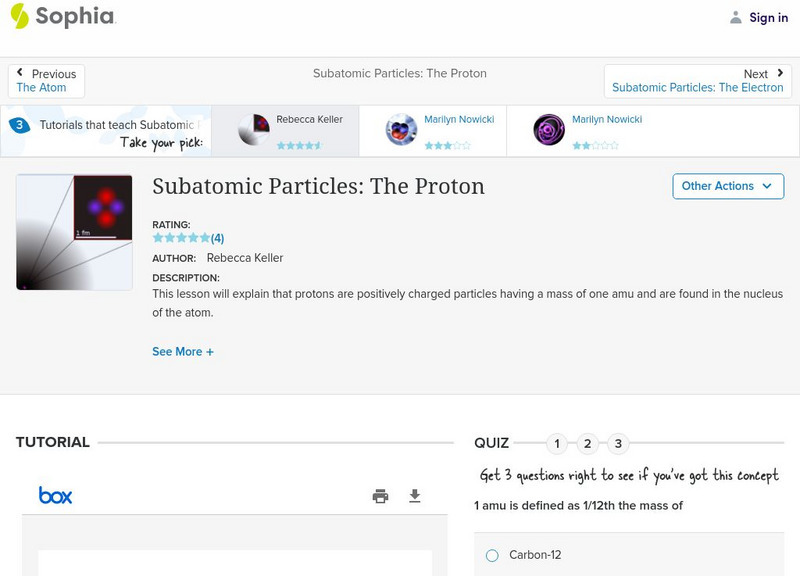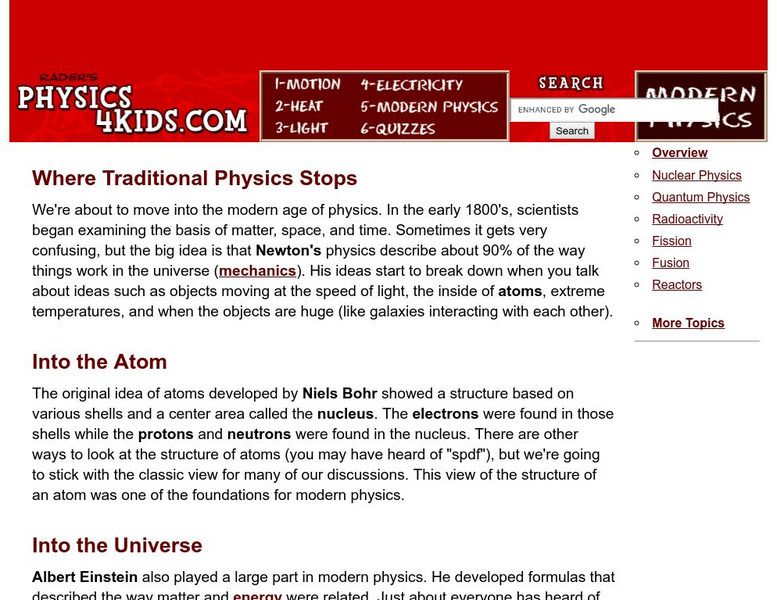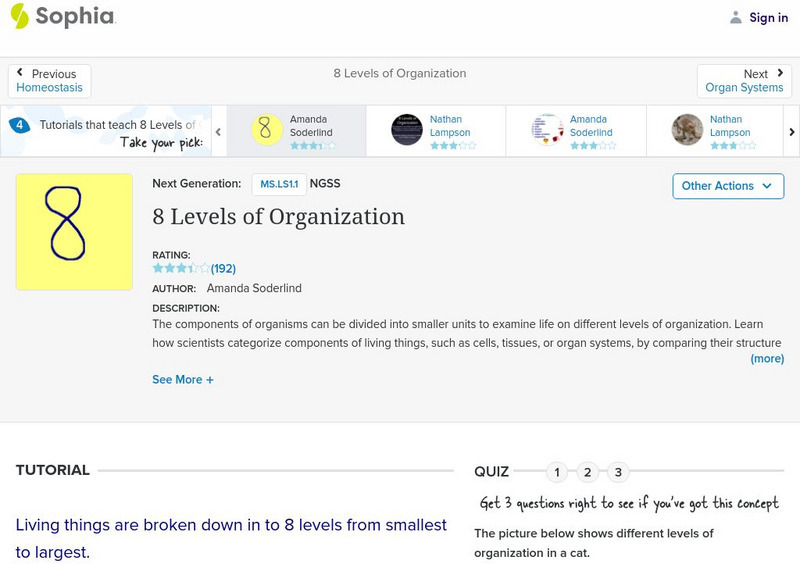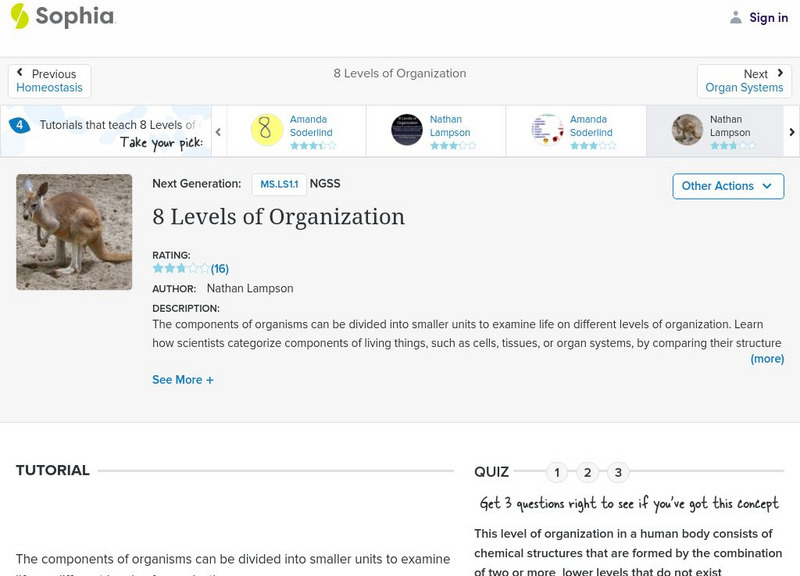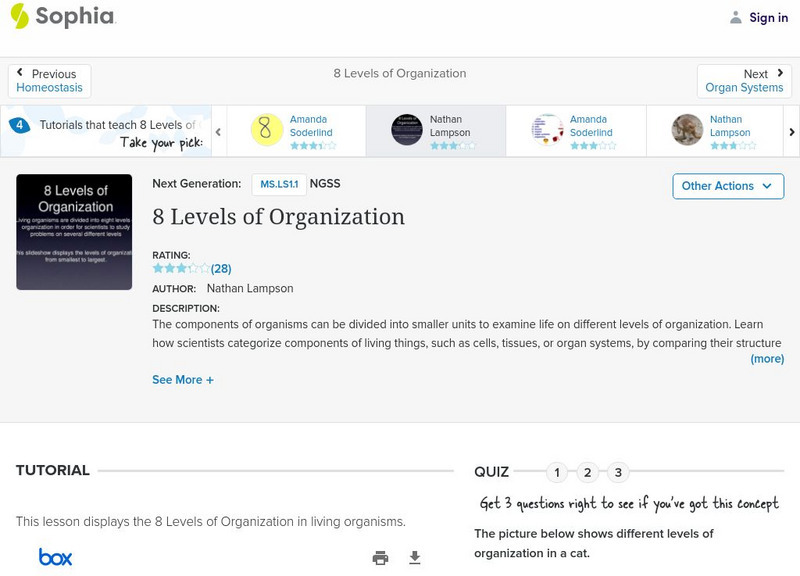Sophia Learning
Sophia: Subatomic Particles: The Electron: Lesson 3
This lesson will explain that electrons are negatively charged particles with negligible mass and are found in pairs in orbitals surrounding the nucleus of an atom. It is 3 of 3 in the series titled "Subatomic Particles: The Electron."
Sophia Learning
Sophia: Subatomic Particles: The Proton: Lesson 2
This lesson will explain that protons are positively charged particles having a mass of one amu and are found in the nucleus of the atom. It is 2 of 3 in the series titled "Subatomic Particles: The Proton."
Sophia Learning
Sophia: The Atom: Lesson 2
This lesson will illustrate that an atom is mostly empty space and has a positively charged, massive core (containing both protons and neutrons called the nucleus) surrounded by negatively charged electrons. It is 2 of 3 in the series...
Ducksters
Ducksters: Science for Kids: The Atom
Kids learn more about the science of the atom. Electrons, neutrons, and protons make up the smallest bits of matter.
Physics4kids
Physics 4 Kids: Where Traditional Physics Stops
We're about to move into the modern age of physics. In the early 1800's, scientists began examining the basis of matter, space, and time. Sometimes it gets very confusing, but the big idea is that Newton's physics describe about 90% of...
Sophia Learning
Sophia: Atomic Radius: Lesson 2
This lesson will define atomic radius. It is 2 of 3 in the series titled "Atomic Radius."
Sophia Learning
Sophia: 8 Levels of Organization: Lesson 2
This lesson will show the 8 levels of organization in living organisms, ranging from smallest to largest. It is 2 of 4 in the series titled "8 Levels of Organization."
Sophia Learning
Sophia: 8 Levels of Organization: Lesson 4
This lesson will show the 8 levels of organization in living organisms, ranging from smallest to largest. It is 4 of 4 in the series titled "8 Levels of Organization."
Sophia Learning
Sophia: 8 Levels of Organization: Lesson 1
This lesson will show the 8 levels of organization in living organisms, ranging from smallest to largest. It is 1 of 4 in the series titled "8 Levels of Organization."
Sophia Learning
Sophia: Atoms: Lesson 3
This lesson will provide an understanding of the basic chemistry of atoms. It is 3 of 5 in the series titled "Atoms."
Sophia Learning
Sophia: Atoms: Lesson 4
This lesson will provide an understanding of the basic chemistry of atoms. It is 4 of 5 in the series titled "Atoms."
Sophia Learning
Sophia: Atoms: Lesson 5
This lesson will provide an understanding of the basic chemistry of atoms. It is 5 of 5 in the series titled "Atoms."
Sophia Learning
Sophia: Converting From Moles to Particles: Lesson 2
This lesson demonstrates how to convert from moles to particles (molecules, atoms, ion). It is 2 of 2 in the series titled "Converting from Moles to Particles."
Sophia Learning
Sophia: Subatomic Particles: The Neutron: Lesson 2
This lesson will explain that neutrons are particles in the nucleus that have no charge and a mass of one amu. It is 2 of 3 in the series titled "Subatomic Particles: The Neutron."
Ducksters
Ducksters: Chemistry for Kids: Elements Cobalt
Kids learn about the element cobalt and its chemistry including atomic weight, atom, uses, sources, name, and discovery. Plus properties and characteristics of cobalt.
Ducksters
Ducksters: Chemistry for Kids: Elements: Copper
Kids learn about the element copper and its chemistry including atomic weight, atom, uses, sources, name, and discovery. Plus properties and characteristics of copper.
Ducksters
Ducksters: Chemistry for Kids: Elements: Fluorine
Investigate the element fluorine and its chemistry including atomic weight, atom, uses, sources, name, and discovery. Plus properties and characteristics of fluorine.
Ducksters
Ducksters: Chemistry for Kids: Elements: Gallium
Learn about the element gallium and its chemistry including atomic weight, atom, uses, sources, name, and discovery. Plus properties and characteristics of gallium.
Ducksters
Ducksters: Chemistry for Kids: Elements: Germanium
Learn about the element germanium and its chemistry including atomic weight, atom, uses, sources, name, and discovery. Plus properties and characteristics of germanium.
Ducksters
Ducksters: Chemistry for Kids: Elements: Halogens
Explore the halogens of the periodic table. Learn about which elements are in this group and the properties, similarities, and other facts.
Ducksters
Ducksters: Chemistry for Kids: Elements: Helium
Explore the element helium and its chemistry including atomic weight, atom, uses, sources, name, and discovery. Plus properties and characteristics of helium.
Ducksters
Ducksters: Chemistry for Kids: Elements: Hydrogen
On this website, the element hydrogen and its chemistry including atomic weight, atom, uses, sources, name, and discovery are discussed. Plus properties and characteristics of hydrogen.
Ducksters
Ducksters: Chemistry for Kids: Elements: Iodine
Find out about iodine's atomic weight, atom, uses, sources, name, and discovery on this website. Also learn about the properties and characteristics of iodine.
Ducksters
Ducksters: Chemistry for Kids: Elements: Iron
On this site, students learn about properties and characteristics of iron. Kids also learn about the element iron and its chemistry including atomic weight, atom, uses, sources, name, and discovery.



